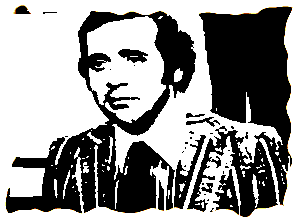Film Review

Whilst it is funny - in some places hilariously so - Moi y'en a vouloir des sous is evidently a cry of despair. It laments the harm that capitalism causes not just to society and to individuals but also - and here the film is perhaps ahead of its time - to the environment. Yet it also admits that left-wing politics will never succeed in taming the capitalist beast and, will in fact be seduced by it into becoming its willing handmaiden. How prescient. Just as the characters in this story sell out to achieve their aims, so socialist parties across the Western world would, in the course of the two decades that followed, jettison most (if not all) of their left-wing ideology just to get themselves into power and keep themselves in power for as long as possible. As the film's closing caption succinctly puts it: the world is made of idiots who fight against the rest to preserve an absurd society.
© James Travers 2009
The above content is owned by frenchfilms.org and must not be copied.
Film Synopsis
In 1973, the landscape of urban France is coloured by protracted strikes and demonstrations by left-wing political activists. Banners and barricades fill the streets. A financial adviser for a large corporation, Benoît Lepape considers himself above this proletarian struggle - at least he does until the day he is dismissed by his boss for using his initiative without permission. When challenged by his uncle Adrien to come up with a better means of serving the interests of the working man than strikes and demonstrations, Benoît has a brainwave: use the tools of capitalism to defeat capitalism! He persuades Adrien to give him his union's funds so that he can buy a bicycle factory. The venture is a success. In no time at all, Benoît accumulates a fortune and begins to build a vast business empire, having convinced his employees that his wealth belongs to them. But when Benoît announces that he wants to quit and hand over the running of his companies to his employees, they demand that he stays. They are even ready to strike to force him to remain...© James Travers
The above content is owned by frenchfilms.org and must not be copied.
Similar Films
Here are some other films you may enjoy watching:- Bless This House (1972)
- The Comedy of Errors (1983)
- Mon curé chez les nudistes (1982)
- Carry on Abroad (1972)
- Les Vieux de la vieille (1960)
Other related links:
Film Credits
- Director: Jean Yanne
- Script: Jean Yanne (dialogue), Gérard Sire (dialogue)
- Cinematographer: Jean Boffety
- Music: Michel Magne
- Cast: Jean Yanne (Benoît Lepape), Bernard Blier (Adrien Colbart), Nicole Calfan (Nicole), Michel Serrault (Léon), Fernand Ledoux (Sauveur Chouras), Jean-Roger Caussimon (L'évêque), André Gaillard (Cherbiller), Jean Obé (Schumacker), Daniel Prévost (Rozales), Jean-Marie Proslier (Brothier), Maurice Vamby (Collon), Teddy Vrignault (Lardel), Jacqueline Danno (Jacqueline), Ginette Garcin (Ginette), Paul Préboist (Vergeot), Jacques François (Delfau), Anjali Kadam (La nurse), Régis Ander (Un syndicaliste), Rene Aranda (Le valet), Henri Attal (Un CRS)
- Country: France / Italy
- Language: French
- Support: Color
- Runtime: 90 min
- Aka: Me, I Want to Have Dough
The best of Russian cinema

The best French war films ever made

The very best fantasy films in French cinema
